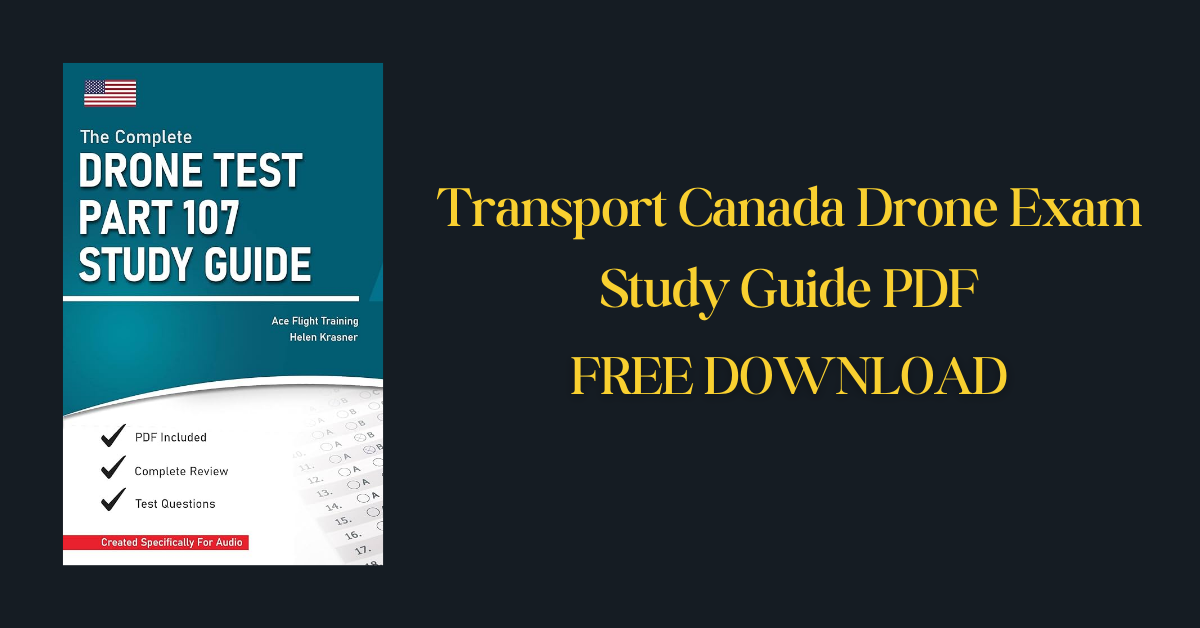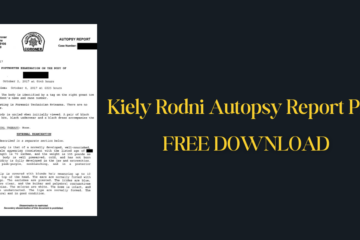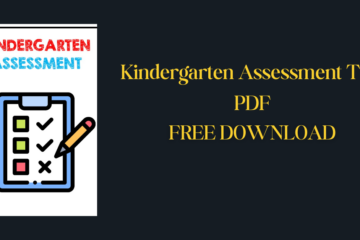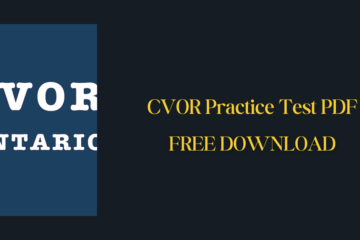For those who want to become certified drone pilots in Canada, passing the Transport Canada Drone Exam is an essential first step.
Also known as the Basic or Advanced Operations Exam, it evaluates candidates on their understanding of Canadian Aviation Regulations (CARs), airspace classifications, weather considerations, emergency procedures, and other essential topics related to drone operations.
| Name of the PDF | transport canada drone exam study guide pdf |
| No. of pages | 43 |
| Category | |
| Language | English |
| PDF Link | Click Here |
Also Download
Mcgraw Hill Ryerson Principles Of Mathematics 10 PDF
What is Transport Canada Drone Exam
The Transport Canada Drone Exam, officially known as the RPAS (Remotely Piloted Aircraft Systems) Certification Exam, is a mandatory test for individuals in Canada who wish to operate drones for advanced operations. Transport Canada requires this certification to ensure drone pilots have the necessary knowledge to safely operate drones in Canadian airspace. There are two main types of exams:
- Basic Operations Exam: This exam is for pilots who plan to fly drones in uncontrolled airspace, more than 30 meters (100 feet) horizontally from bystanders, and never over bystanders. To take the exam, you must be at least 14 years old.
- Advanced Operations Exam: This exam is for pilots who wish to fly in controlled airspace, within 30 meters (100 feet) of or over bystanders. To take the exam, you must be at least 16 years old. Passing the Advanced Operations Exam is just one part of obtaining the Advanced Operations Certificate; pilots must also pass a flight review with a certified reviewer.
The exams cover various topics relevant to drone operation, including air law, navigation, meteorology, and flight operations. The knowledge requirements are based on the Canadian Aviation Regulations (CARs) related to drone use.
Eligibility Criteria for Taking the Exam
The eligibility criteria for taking the Transport Canada Drone Exams for both Basic and Advanced Operations are outlined by Transport Canada and include the following key requirements:
For the Basic Operations Exam
- Age Requirement: You must be at least 14 years old to take the Basic Operations Exam.
- Drone Registration: You need to register your drone with Transport Canada if it weighs between 250 grams and 25 kilograms.
For the Advanced Operations Exam:
- Age Requirement: You must be at least 16 years old to take the Advanced Operations Exam.
- Drone Registration: Like with the Basic exam, your drone must be registered with Transport Canada if it weighs between 250 grams and 25 kilograms.
- Flight Review: After passing the Advanced Operations Exam, you also need to successfully complete a flight review with a certified reviewer. This is a practical test of your flying skills and understanding of the regulations.
General Requirements for Both Exams:
- Canadian Resident: While not explicitly stated as a requirement, these exams are designed for individuals operating drones within Canada. International pilots intending to fly drones in Canada must comply with Canadian regulations.
- Valid Email and Identification: You need to have a valid email address for registration on the Transport Canada portal and may need to provide identification as part of the exam registration or flight review process.
These criteria ensure that drone pilots have the necessary knowledge and skills to operate drones safely in Canadian airspace, minimizing risks to people, aircraft, and property. Always refer to the latest guidelines from Transport Canada, as regulations and requirements may evolve.
Structure and Content of the Exam
The Transport Canada Drone Exams are categorized into two main types: the Small Basic Exam and the Small Advanced Exam, each tailored to different operational needs and levels of expertise.
Small Basic Exam
- Structure: The exam consists of 35 multiple-choice questions.
- Duration: You have 90 minutes to complete it.
- Passing Score: A minimum of 65% is required to pass.
- Fee: There’s a $10 fee for each attempt.
Small Advanced Exam
- Structure: This exam features 50 multiple-choice questions.
- Duration: Candidates have 60 minutes to complete the exam.
- Passing Score: An 80% score or higher is needed to pass.
- Fee: Like the Basic Exam, each attempt costs $10.
- Additional Steps: Passing the Advanced Exam is only part of the requirement for obtaining the Pilot Certificate – Advanced Operations. You must also complete a flight review with a certified reviewer.
For both exams, if you do not pass, you must wait 24 hours before you can retake them. The exams are designed to assess a comprehensive range of knowledge areas essential for safe drone operation, including air law, flight operations, and meteorology, among others.
The content of the exams is aligned with the Knowledge Requirements for Pilots of Remotely Piloted Aircraft Systems provided by Transport Canada. However, the specific questions on the actual exams are not published or directly replicated in any preparatory materials due to regulatory restrictions.
It’s also worth noting that there are specific recommendations for practice exam scores to aim for before taking the official Transport Canada test: at least 80% correct answers for the Basic Operations practice exam and 90% for the Advanced Operations practice exam, as per guidelines from preparatory resources like Drone Exam Canada.
This suggests a higher standard for preparedness, especially for the Advanced Exam, which requires a deeper understanding of the regulations and operational procedures.
Importance of Passing the Exam
Passing the Transport Canada Drone Exam, whether for Basic or Advanced Operations, is crucial for several reasons, emphasizing safety, legality, and proficiency in drone operation within Canadian airspace. Here’s why it’s important:
Operational Permissions: Passing the exam grants you the legal right to operate a drone under certain conditions in Canada, aligning with the Canadian Aviation Regulations (CARs). Without passing the exam, you would be operating illegally if you fall outside the very limited recreational parameters set by Transport Canada.
Certification: The exam is a prerequisite for obtaining either the Basic or Advanced Pilot Certificate, which is mandatory for drone pilots who wish to conduct more complex operations, including flying near people or in controlled airspace.
Risk Mitigation: The knowledge gained while preparing for and passing the exam helps to mitigate risks associated with drone flying, for both the operator and the public. Understanding airspace classification, weather impacts, and emergency procedures reduces the potential for accidents.
Public Safety and Privacy: Knowledge of legal and safety requirements around drone operation helps protect the safety and privacy of the public. This includes adhering to regulations regarding flying near people, over crowds, and respecting privacy laws.
Skill Validation: Passing the exam validates your skills and knowledge as a drone pilot, which is essential for professional development and credibility in the field. For those looking to use drone technology in their business or profession, certification is often a requirement.
Access to Advanced Operations: The Advanced Operations certificate allows for more complex operations, including flying in controlled airspace, closer to people, and at night (with the right conditions and equipment). This opens up opportunities for professional services such as aerial photography, surveying, and inspections.
Keeping Updated with Regulations: Drone laws and regulations are continually evolving. Preparing for and passing the exam ensures that pilots are up-to-date with the latest regulatory requirements, helping them to adapt to changes in the legal landscape for drone operation.
Insurance Requirements: Many insurance policies for drone operations require certification as a condition for coverage. Being certified can also impact the terms and conditions of your insurance, potentially leading to better rates and coverage options.
Reduced Liability: Certified pilots who adhere to regulations are less likely to be held liable in the event of an accident or incident. This certification provides a level of protection by demonstrating compliance with safety standards.
Key Concepts Covered in the Exam
The Transport Canada Drone Exams for both Basic and Advanced Operations cover a wide range of topics designed to ensure that drone pilots have a comprehensive understanding of the rules, regulations, and best practices for safely operating drones. Here are some of the key concepts covered in the exams:
Air Law, Regulations, and Procedures
- Canadian Aviation Regulations (CARs): Understanding the specific regulations that apply to drone operations.
- Privacy Laws: Knowledge of how to operate drones without infringing on individuals’ privacy.
- Flight Authorization: Procedures for obtaining permission to fly in controlled or restricted airspace.
Aeronautics and Flight Operations
- Aerodynamics: Basic principles of flight and how they apply to drones.
- Drone Systems and Performance: Knowledge of how drones work, including propulsion systems, flight controls, and performance factors.
- Pre-flight Planning: Understanding how to plan a flight, including assessing weather conditions, choosing a safe location, and determining the airspace classification.
Navigation
- Map Reading and Interpretation: Skills in using aeronautical charts and understanding airspace structure.
- Global Positioning System (GPS): How drones use GPS for navigation and the limitations of GPS technology.
Meteorology
- Weather Conditions: Understanding how different weather conditions affect drone operations.
- Weather Forecasts and Reports: How to interpret weather forecasts and reports to make informed decisions about when and where to fly.
Operations
- Emergency Procedures: How to respond to emergencies, including technical failures and loss of control.
- Risk Management: Identifying and mitigating risks associated with drone operations.
- Human Factors: Awareness of how human factors like fatigue and stress can impact drone operations.
Radio and Communication
- Basic Radio Theory: For Advanced Operations, understanding how to communicate effectively with air traffic control when required.
These topics are designed to ensure that drone pilots are well-prepared to operate their drones safely and responsibly within the Canadian airspace system. For those preparing for the exams, it is crucial to study these areas thoroughly.
Transport Canada Drone Exam Study Guide
Transport Canada provides comprehensive study resources for drone pilot certification exams.
Recommended materials include
- RPAS 101 – A general knowledge guide for Canadian RPAS pilots
- Transport Canada Aeronautical Information Manual (TC AIM)
- Knowledge Requirements for Pilots of Small Remotely Piloted Aircraft Systems (TP 15263)
For those aiming for advanced operations, suggested additional resources are
- Human Factors for Aviation – Basic and Advanced Handbooks
- Study Guide for the Radiotelephone Restricted Operator Certificate – Aeronautical (RIC)
These resources are crucial for understanding the regulations, operational procedures, and safety practices essential for drone pilots in Canada.
Tips to Prepare for the Exam
Preparing effectively for the Transport Canada Drone Exams, whether for Basic or Advanced Operations, is essential to ensure you have the knowledge and skills to operate drones safely and legally. Here are some tips to help you prepare:
- Review the Study Guide: Transport Canada provides detailed study guides for both the Basic and Advanced exams. These guides outline all the knowledge requirements and are a good starting point for your preparation.
- Understand the Regulations: Familiarize yourself with the Canadian Aviation Regulations (CARs) related to drone operations. Understanding the legal framework is crucial for both exam success and safe drone operation.
- Take Online Courses: Consider enrolling in online courses designed specifically for drone pilots. Many of these courses offer comprehensive training on all aspects covered in the exams.
- Practice with Sample Questions: Practice exams and sample questions can give you a good sense of the exam format and the types of questions you’ll face. They also help identify areas where you need more study.
- Join a Drone Pilot Community: Joining online forums or local groups of drone enthusiasts can provide valuable insights and tips from experienced pilots. You can learn from their experiences and get advice on preparing for the exam.
- Understand Airspace and Weather: Knowledge of airspace classification and weather impacts on drone flight is crucial. Use aeronautical charts and weather resources to practice interpreting these critical factors.
- Learn from Real-World Scenarios: Applying your knowledge to real-world scenarios can enhance your understanding. Think about how you would plan and execute flights in different conditions and locations.
- Focus on Weak Areas: Identify areas where you’re less confident and focus your study efforts on these topics. This targeted approach can improve your overall readiness for the exam.
- Schedule Regular Study Sessions: Consistent, focused study sessions are more effective than cramming. Set a study schedule that allows you to cover all topics thoroughly.
- Stay Updated: Drone regulations and technology are constantly evolving. Stay updated with the latest information from Transport Canada and other reliable sources.
- Prepare Logistically for Exam Day: Ensure you understand the exam process, including registration, fees, and what to expect on the day of the exam. Make sure you have a reliable internet connection for the online exam.
- Use Official Resources: Always refer to official Transport Canada documents and resources for the most accurate and reliable information.
Conclusion
Mastering the Transport Canada drone exam is essential for any aspiring drone pilot to ensure safe and responsible operation of unmanned aerial vehicles within Canadian airspace.
By diligently studying the regulations, understanding flight principles, and familiarizing oneself with key safety protocols, individuals can not only pass the exam but also contribute to a culture of safe drone operation.
Remember, the knowledge gained through this process goes beyond passing a test; it equips pilots with the skills and awareness necessary to navigate the skies confidently and responsibly.
FAQs
What is the Transport Canada drone exam?
The Transport Canada drone exam, officially known as the Remotely Piloted Aircraft Systems (RPAS) Pilot Certificate exam, is a knowledge test that individuals must pass to obtain a Pilot Certificate for flying drones legally in Canada.
Who needs to take the Transport Canada drone exam?
Anyone who wishes to operate a drone for non-recreational purposes in Canada, including commercial, educational, or research purposes, must obtain a Pilot Certificate by passing the Transport Canada drone exam.
What topics are covered in the exam?
The exam covers various topics related to drone operation, including Canadian aviation regulations, air law and procedures, meteorology, navigation, flight operations, and drone safety.
How can I prepare for the Transport Canada drone exam?
Preparation typically involves studying the official Transport Canada study guide and other resources provided by Transport Canada. Additionally, there are online courses and study materials available from approved training organizations.
Where can I take the exam?
The exam can be taken at authorized Transport Canada examination centers located across Canada. These centers are typically flight schools or aviation training organizations.
How much does the exam cost?
The cost of the exam may vary depending on the examination center, but it typically ranges from $100 to $150 CAD.
What happens if I fail the exam?
If you fail the exam, you can retake it after a waiting period, usually within a few days. However, you may need to pay the exam fee again for each attempt.
How long is the Transport Canada drone exam valid?
Once you pass the exam and obtain your Pilot Certificate, it is valid for five years. After five years, you will need to renew your certificate by meeting certain requirements set by Transport Canada.
Can I fly a drone in Canada without passing the Transport Canada drone exam?
No, if you want to fly a drone for non-recreational purposes in Canada, you must pass the Transport Canada drone exam and obtain a Pilot Certificate.
Where can I find more information about the Transport Canada drone exam?
Additional information about the exam, including study guides, exam locations, and regulations, can be found on the Transport Canada website or by contacting Transport Canada directly.

Niketa Mulay, a seasoned content writer and editor, has over a decade of experience. With a Master’s in Journalism, she honed her skills at The Times of India and now freelances across various industries. Passionate about reading, writing, and scuba diving, she shares expert PDF guides and tips at PDFdrivehub.com.




